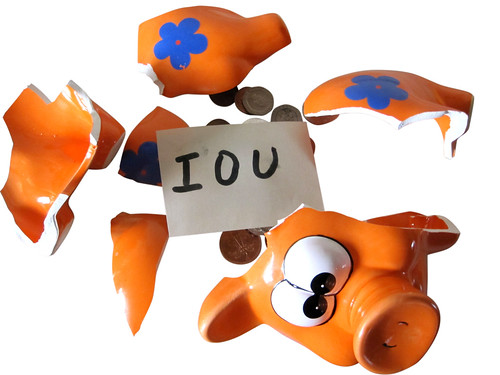
Imagine you have been trying to obtain credit and failing because you did not respond adequately to a letter you received six years ago. Imagine all those years of frustration as your applications for phone contracts, credit cards and loans have been turned down, watching your dreams of owning a property come to nothing. This is the price you will pay if you do not take CCJ’s seriously.
What is a CCJ?
A CCJ is a county court judgement. It is a legal demand issued against you if you fail to pay money you owe to a creditor. It tells you how much money is owed and states a time frame during which you are required to repay the debt.

Photo courtesy of images courtesy of Images of Money on Flickr
What do they mean?
Your creditor will have already sent you a warning of their intent, which will be in the form of a “default notice” or a “letter before action”. Upon failure to reach an agreement or receiving no reply, the creditor will then begin legal proceedings and will apply for a judgement to be made against you by the county court. You will also receive an admission form, which is your chance to state your side of the case, but you have only 14 days to do so, otherwise the CCJ may be issued by default.
You have several options:
1) You can pay immediately within 30 days.
If you pay your CCJ within 30 days your details will not be placed on the Register of Judgements, Orders and Fines and your case will be closed. Otherwise the details of your case are kept for up to six years, causing extreme difficulties to your financial affairs. This is also the facility used by banks, building societies and other lenders to decide whether to give you credit. So if you do owe the money, it is in your best interests to pay what you can afford as soon as possible.
2) You can pay in full, but not within 30 days.
If you pay the CCJ after the 30 day period, you will be asked to provide details of your personal finances to ascertain payments you can afford. Your details will be placed on the register, and will be stored for six years, either stating ‘satisfied’ next to your file, highlighting that the amount has been paid in full, or ‘unsatisfied’ if the debt has not be paid. Again, banks and other credit agencies will be able to access this information.
3) You can ask to ‘set aside’ the judgement.
This will cost £75 in court fees. To have the CCJ set aside does not mean that the case is closed. It determines that some of the facts are incorrect or wrongly presented by your creditor and consequently they are ordered to re-submit the forms.
You will need to provide good reasons for asking the court to set aside a CCJ, otherwise you may find yourself charged with wasting court time. This can result either in a court fine and in some cases a prison sentence.
If your case is set aside, re-submitted and the case against you proved, then the length of time your information will be kept on the CCJ register may be longer because the process will be started over again.
4) You can make a counter-claim
If you believe that you are the party that is owed money, you are entitled to make a counter-claim. For example, if a contractor issues a CCJ against you for non-payment of services, you might consider suing the contractor for breach of contract. The court will then review your claim to consider whether it should be upheld or thrown out.
5) You can ignore the CCJ
This will result in further court action. This could mean:
• A charging order is placed on any property you own, securing the debt against your home.
• An attachment of earnings order is issued to deduct the money directly from your wages, notifying your employer of your situation.
• A warrant of execution is issued, giving bailiffs jurisdiction to visit your home to seize goods to the value of the money you owe.
CCJ removal
The Office of Fair Trading has issued a public warning about credit repair companies that offer quick-fix schemes to remove your file from the CCJ register, but as the Director General of the OFT points out:
“County court judgments cannot be removed from credit files unless they have been discharged (within a month) or were incorrectly granted.”
Disreputable companies have even been known to offer misleading advice or even act as a front to sell loans.
The importance of getting professional CCJ advice
There are no short cuts or quick-fixes when dealing with county court judgements. That is why it is imperative that you seek professional advice from trusted debt specialists. These experts will help you if have received court forms or have CCJ’s that you cannot afford to pay.
Remember, if you receive a county court judgement:
• Check that the details and the owed amount is correct
• If you can, pay the full amount within 30 days
• If you cannot pay within 1 month, your details will be stored on the CCJ register
• If you pay after the 30 day limit, banks and other credit agencies will able to see you have paid, but your file will continue to be stored for up six years
• A CCJ will make it difficult to obtain credit
Do not take the CCJ’s lightly. Seek immediate advice and act quickly, otherwise you may have a long time spent regretting your mistake ahead.
Amy Fry is a writer specialising in the area of personal finance, and discusses a range of topics including budget planning, debt solutions and savings schemes. Amy spends her spare time taking city breaks across Europe and riding her bike along the seafront in Brighton, where she currently lives and works.


 12+ years sharing great legal advice
12+ years sharing great legal advice
